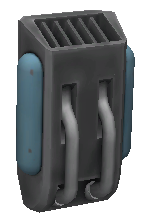Atmospheric Fluid Spectro-Variometer
| Atmospheric Fluid Spectro-Variometer | ||
| Environmental sensor by Probodobodyne Inc | ||
| Radial size | Radial mounted | |
| Cost | (total) | 6 500.00 |
| Mass | (total) | 0.005 t [1] |
| Drag | 0.2 [1] | |
| Max. Temp. | 1200 K | |
| Impact Tolerance | 8 m/s | |
| Research | | |
| Unlock cost | 12 200 | |
| Since version | 1.0 | |
| Part configuration | sensorAtmosphere.cfg | |
| Experiment | Atmosphere Analysis | |
| Collectable | Yes | |
| Rerunnable | Yes | |
| Resettable | Yes | |
| Electricity required | None | |
| Packed volume | 130 l | |
| ||
The Atmospheric Fluid Spectro-Variometer was added with version 1.0 of Kerbal Space Program and replaces the Sensor Array Computing Nose Cone in performing atmospheric analysis for science. This sensor provides valuable data on the atmospheres of the proper celestial bodies, including Eve, Kerbin, Duna, Jool, and Laythe (it does nothing elsewhere). It is much larger than many of the other science instruments, with the exception of the SC-9001 Science Jr.. It has a size comparable with the Mystery Goo™ Containment Unit, but is slightly wider.
This device cannot take data in space. As of version 1.0.5, experimental data from the device gives three times as many science points as temperature data, but unlike the 2HOT Thermometer it must be collected in multiple samples to get maximum science.
In career mode, it is available with Science Tech, at level 7 of the technology tree.
Product description
| “ | A device for performing accurate fluid spectro-variometry scans of the surrounding atmosphere. Despite some criticism claiming that fluid spectro-variometry isn't a real science, Kerbal scientists seem to all agree that the data it provides is definitely interesting. Warranty void if exposed to air. — Probodobodyne Inc |
” |
History
- Changed tech from Field Science to Science Tech
- Initial release
